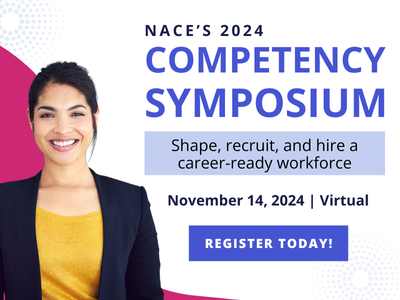“An additional 1.4 million jobs could open to workers without college degrees over the next five years.” This claim comes from the researchers who worked on the Harvard Business Review and The Burning Glass Institute 2022 report. A year prior to this report, IBM, Google, Comcast NBC Universal, and more than 50 other companies, with the backing of the Ad Council and Opportunity@Work, launched a multiyear PSA blitz called “Tear the Paper Ceiling.”
“Tearing down the paper ceiling is about bringing in talent based on skills, not degrees; performance, not pedigree; and inclusion, not exclusion” Bryon Auguste, CEO of Opportunity@Work said in a press release announcing the venture.
Of course, employers should focus on hiring the right talent, but Auguste seems to argue that employers must make a choice between skills or a degree. But are college graduates not skilled? Universities integrating career readiness competencies would rightfully argue those with degrees are not only knowledgeable in their area of study, they’re also adept in workplace skills.
According to NACE, career readiness is “a foundation from which to demonstrate requisite core competencies that broadly prepare the college educated for success in the workplace and lifelong career management.” The competencies for career readiness include a mix of hard and soft skills, such as communication, critical thinking, leadership, teamwork, and technology skills. Many of these skills can and are learned within the workforce, but a move toward skills-based hiring is not free of barriers.
“How do I gain experience, if nobody will hire me without experience” is a common, albeit frustrating, paradox many young adults confront. However, universities integrating career readiness competencies into their curriculum can be the sledgehammer to this barrier. Students not only learn the subject, but they also gain the skills employers seek.
Consider the biology professor who seeks to integrate career competencies into their syllabus. A group research project can easily incorporate teamwork, leadership, and critical thinking skills into the grading rubric. In effect, students will prioritize the respective learning outcomes such as adequate compromise, diligent planning, and celebrating diverse perspectives because their grade depends on it. But they will give equal attention to the subject matter, as this, too, is of equal importance.
The integration of career competencies into the classroom is not unlike the way the professional workplace operates. When employers assign a specific objective for their team to achieve, team members must effectively communicate, lead, and think critically to have any chance at a successful result. The outcome is never relegated to simply knowing the subject.
Four-year graduates who attend universities with career competencies integrated into the curriculum are equipped with this deeper understanding of employable workforce skills to accompany the knowledge developed about their specific major. And better yet, they have the “paper” to prove it.






